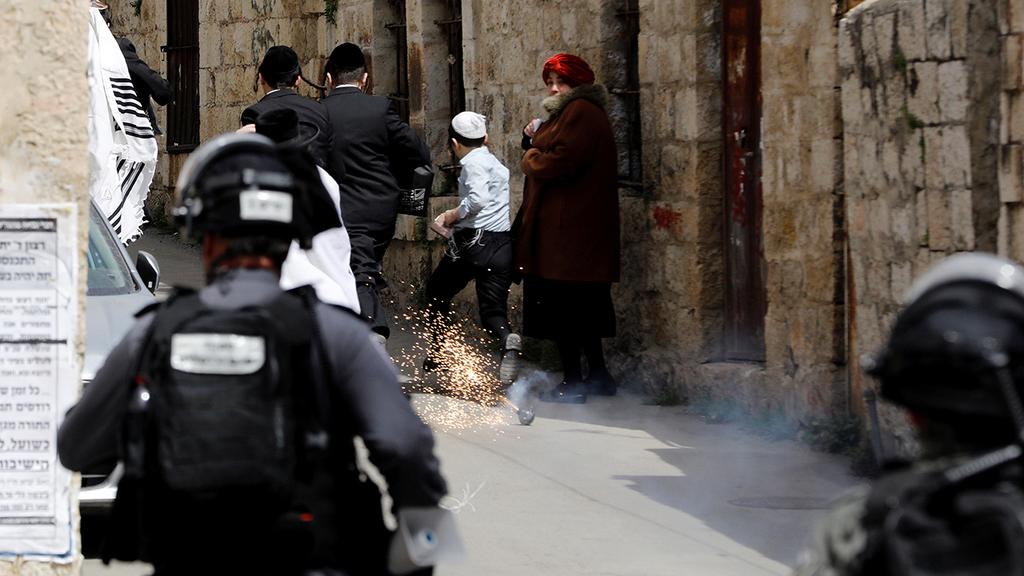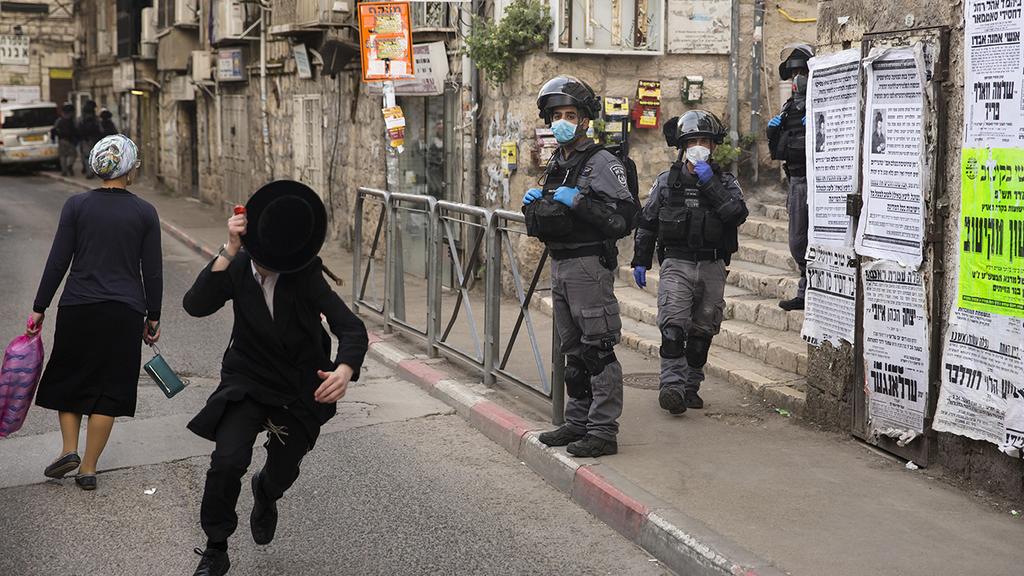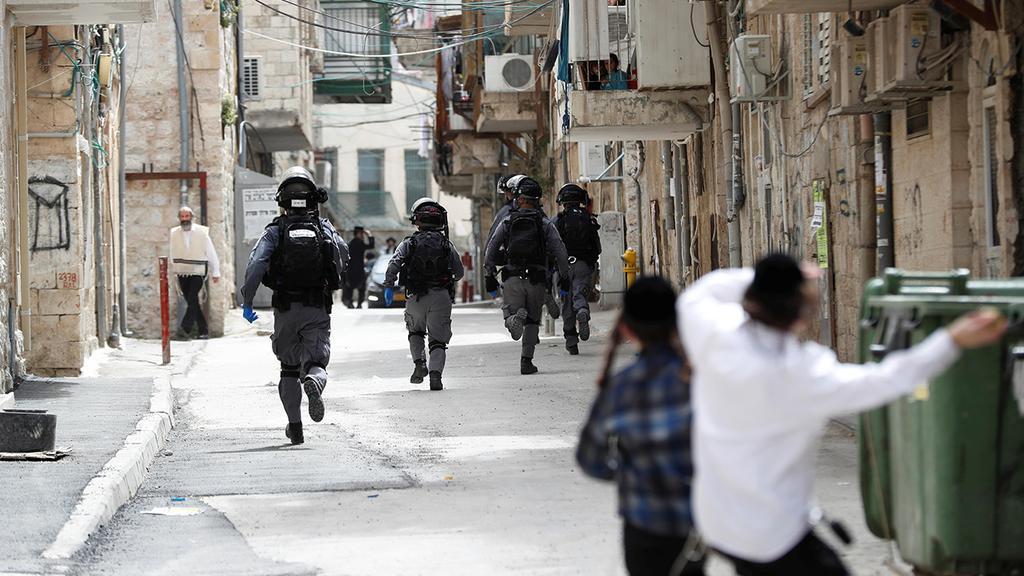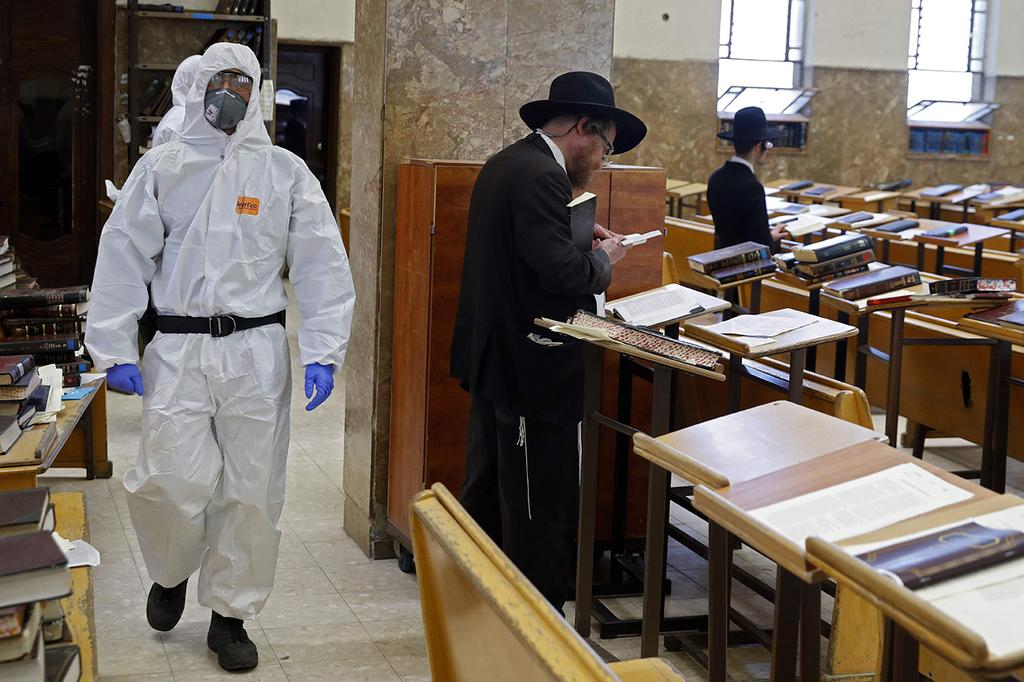Getting your Trinity Audio player ready...
The number of ultra-Orthodox coronavirus patients is relatively large and the infection rate is five times faster than the rest of the population, all in all, they are the largest risk group.
This looming disaster is the result of Bnei Brak's late response to the pandemic. The city's ultra-Orthodox population has major gaps in knowledge and understanding of the disease and its dangers due to their disconnect from the media and online information.
4 View gallery


Confrontation between police forces and the Ultra-orthodox in Jerusalem's Mea Shearim
(Photo: Reuters)
Most of them haven’t watched Prime Minister Benjamin Netanyahu’s daily briefings and just continued with their daily lives as if nothing changed, knowing vaguely that there is an illness going around, but with no real sense of danger.
Not only that, but the alarm that did go off was silenced because the ultra-Orthodox didn’t believe the measures taken to stop the virus applied to them.
The very identity of the Ultra-orthodox, their very existence, is the study of the Torah, praying in a minyan (a prayer in a quorum of 10 Jewish men aged 13 and over) is a top priority and the very thought that synagogues and yeshivas may close down is absurd to them.
The authorities, who do not have the trust of the ultra-Orthodox, failed in their efforts to change the sector's state of mind, because how can you shut down Torah studies for children? How will the souls of the departed find their way without the proper prayer?
When it comes to religion, the rabbis are the highest authority and the ultra-Orthodox community listens to them above all else.
An example of that was a video that circulated among the ultra-Orthodox community, in which a grandson of one prominent rabbi is seen asking his grandfather if they should heed the government's regulations.
4 View gallery


Enforcing regulations in Jerusalem's ultra-Orthodox Mea Shearim neighborhood
(Photo: Getty Images)
“No,” says the rabbi without hesitation and without seeing all the facts.
This is nothing less than infuriating to an observer on the outside but is a clear example to the DNA of the average ultra-Orthodox, who believes that the best way to combat danger is by studying even harder.
This event, which still hasn’t reached its peak, will have far-reaching consequences on the ultra-Orthodox community, the charisma of the Torah leadership will take a blow, as a large majority of rabbis were wrong on issues of death and life.
It is safe to assume that the ultra-Orthodox community will see that vast knowledge of the Jewish scripture is just that and not supreme wisdom that can be applied to other matters.
The Talmudic saying that states that the Torah “shelters and protects” was used as a rationalization behind the rabbis' instructions not to heed the regulations.
The same statement is also a theological basis for not enlisting ultra-Orthodox to the ranks of the IDF, because according to them, studying the Torah is no different than serving in a combat unit.
Recent events have proven that Torah studies are not a substitute for practical, life-saving practices when it comes to issues of health and national security?
The use of technology may increase among the ultra-Orthodox, as it was proven that access to information via smartphone or a computer can be life-saving.
4 View gallery


Confrontation between police forces and ultra-Orthodox in Jerusalem's Mea Shearim neighborhood
(Photo: Reuters)
The ultra-Orthodox now see that the state is more than just a "house committee" that the sector could use, but the one who shelters and protects.
The police officers that the state deploys to Bnei Brak while risking their own lives, will save the city from itself, and the ultra-Orthodox public understands it.
Finally, the ultra-Orthodox majority feels a growing resentment towards its more extreme elements, who make up one-tenth of the population.
These extremists are seen as harmful to the ultra-Orthodox majority and the majority will denounce them for it. This will allow for a more stable and healthy relationship between the ultra-Orthodox public and the rest of the population.
In the meantime, we are experiencing the opposite. The hate towards the ultra-Orthodox population grows, not unlike what the religious Zionist community went through after the murder of Yitzhak Rabin in 1994.
The general population is furious since the behavior of the ultra-Orthodox community can cause great shortages in respirators in hospitals, putting others at risk.
We must reject this hateful discourse for it is fundamentally wrong. The ultra-Orthodox community's behavior - whose consequences will affect us all, but first and foremost it will affect the ultra-Orthodox themselves - is not intentionally exploitative or offensive.
This is a mistake stemming from cultural differences and this hatred may hinder a crucial process for the future of Israel: the integration of the ultra-Orthodox into society, which only began in the last decade.
These are delicate times that must be coursed without playing into the hands of the ultra-Orthodox isolationists who would push for ultra-Orthodox to isolate themselves further from the rest of society, back to the ghetto.
The mayor of Ramat Gan has proposed to build a border wall with Bnei Brak - a far-fetched proposal, of course, but one that symbols a possible mental wall between the general population and the ultra-Orthodox community and It is up to us to resist such efforts to spread hate.
The ultra-Orthodox rabbis can tear down the walls if they choose to do so and maybe they could even offer prayers and confessions online and broadcast it to their followers.


